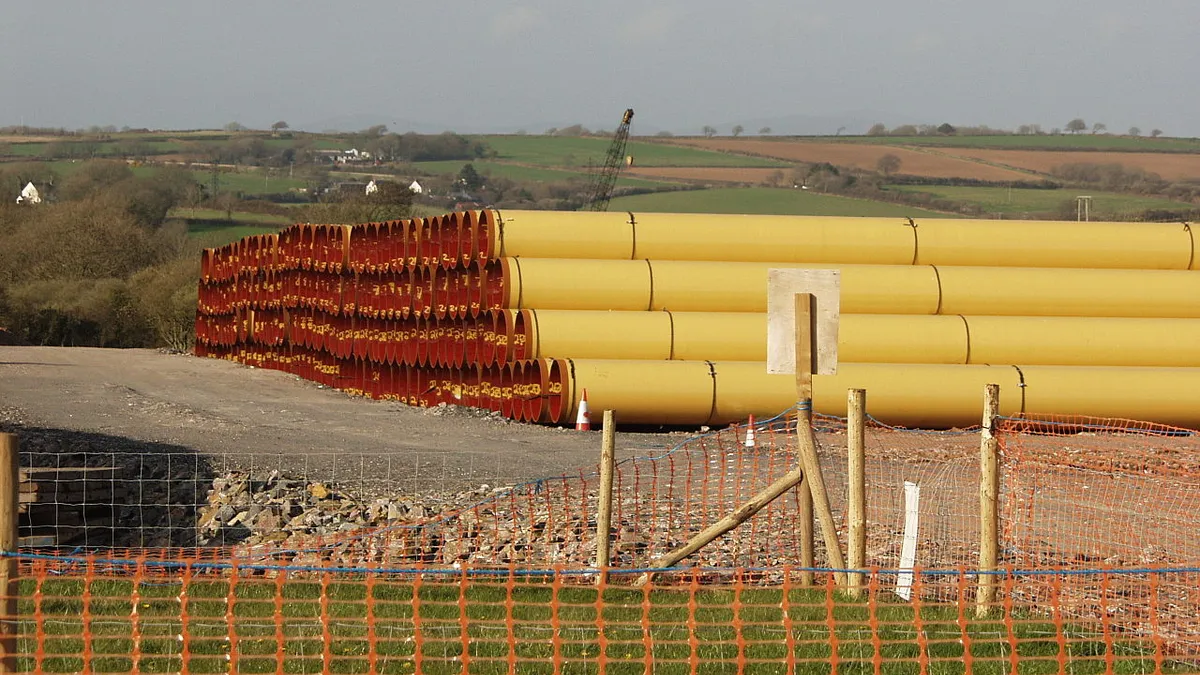Dive Brief:
-
The Federal Energy Regulatory Commission (FERC) allowed developers of the Mountain Valley Pipeline to restart construction on the first 77 miles of the project, saying it was the best option to diminish potential environmental impacts of partially completed work.
-
FERC halted construction on the pipeline on Aug. 3 after a federal appeals court threw out permits for where the project would cross a national forest in Virginia. Developers argued they should be allowed to restart work on the first section of the pipeline to prevent soil erosion.
-
FERC accepted that argument on Wednesday, saying 80% of the trees along the first section of the pipeline had already been felled. Not continuing construction, it said, would "result in significant areas being subject to erosion and soil movement for an indeterminate period, possibly negatively affecting plant and wildlife habitat and adjacent water bodies."
Dive Insight:
FERC's Wednesday letter on the 300-mile Mountain Valley Pipeline shows that the commission can be receptive to developer pleas to restart limited construction, even if some parts of a pipeline may need to be rerouted.
That could bode well for another major project, the 600-mile Atlantic Coast Pipeline, which FERC halted last week after a similar ruling from the Fourth Circuit Court of Appeals, the same one that invalidated the MVP permits.
In both cases, judges took issue with where the projects would cross national park land, which requires special permitting from federal agencies. Without those permits, the court ruled that construction certificates awarded by FERC for the projects are invalid, pushing the federal commission to issue stop-work orders.
Pipeline developers must now work with the agencies, including the Forest Service, Bureau of Land Management and the Army Corps. of Engineers to reroute the projects. The owners of the MVP project say they have released about half of their workers in response to the construction pause and have pushed the expected project completion date to the end of next year.
Despite the delay, regulators expect MVP to move forward eventually. FERC in its stop-work wrote there is "no reason" that the agencies "will not be able to comply with the Court's instructions and to ultimately issue new right-of-way grants that satisfy the Court's requirements."
Even so, the construction pauses have given an opening to environmental groups, who filed fresh court challenges and held rallies this week against the projects. Opponents say the pipelines are unnecessary and will disrupt fragile ecosystems while locking in the use of fossil fuels for decades to come.
Project critics will likely have a stronger hand at FERC if the issue returns to the commission. Last month, Republican Commissioner Robert Powelson stepped down from his post early, allowing Democrats to deadlock commission votes until a replacement is confirmed.
The two Democrats on FERC have voted against the approval of many pipelines in the past year, but it remains unclear if they will move to freeze construction on the projects with their newfound leverage. This week, Democrat Commissioner Richard Glick said he hoped to "reset the question" on pipelines during the vacancy.
"Maybe we all stuck to our guns a little and we all ran to our sides, and now we're in a situation where we can't do that any longer at least until another slot is filled," he said. "So I'm hoping to work with the chairman and Commissioner Chatterjee and certainly Commissioner LaFleur for figuring out a path forward."













